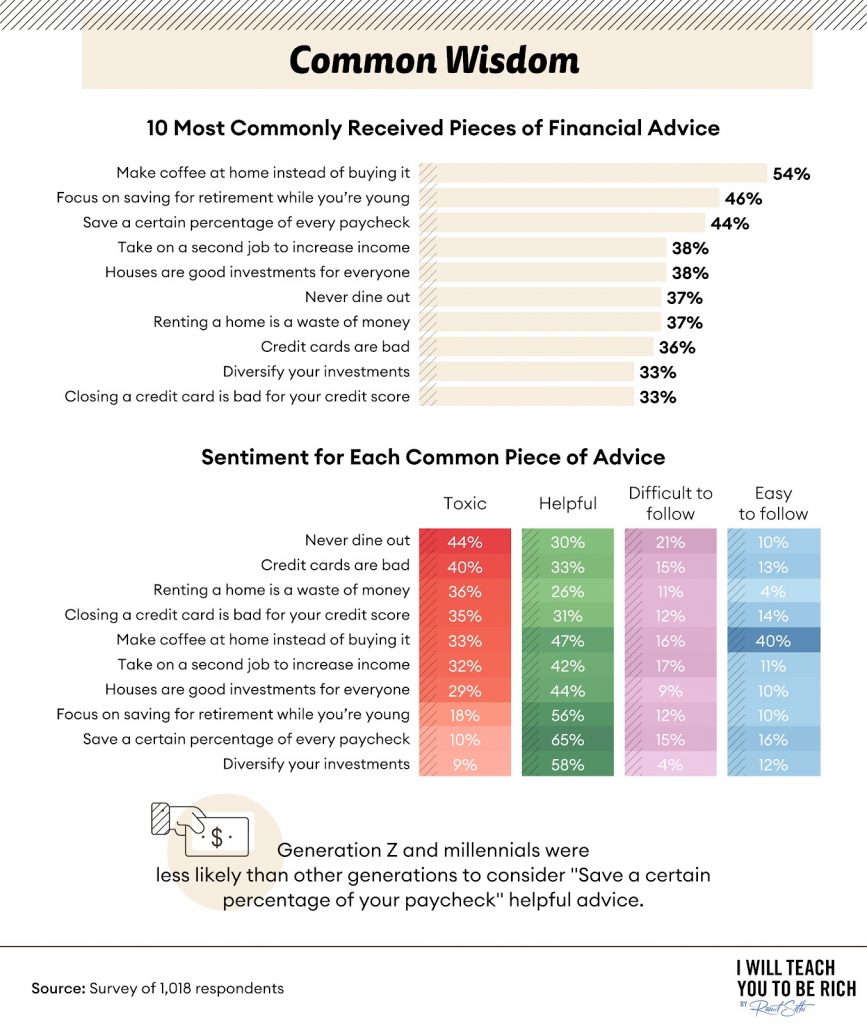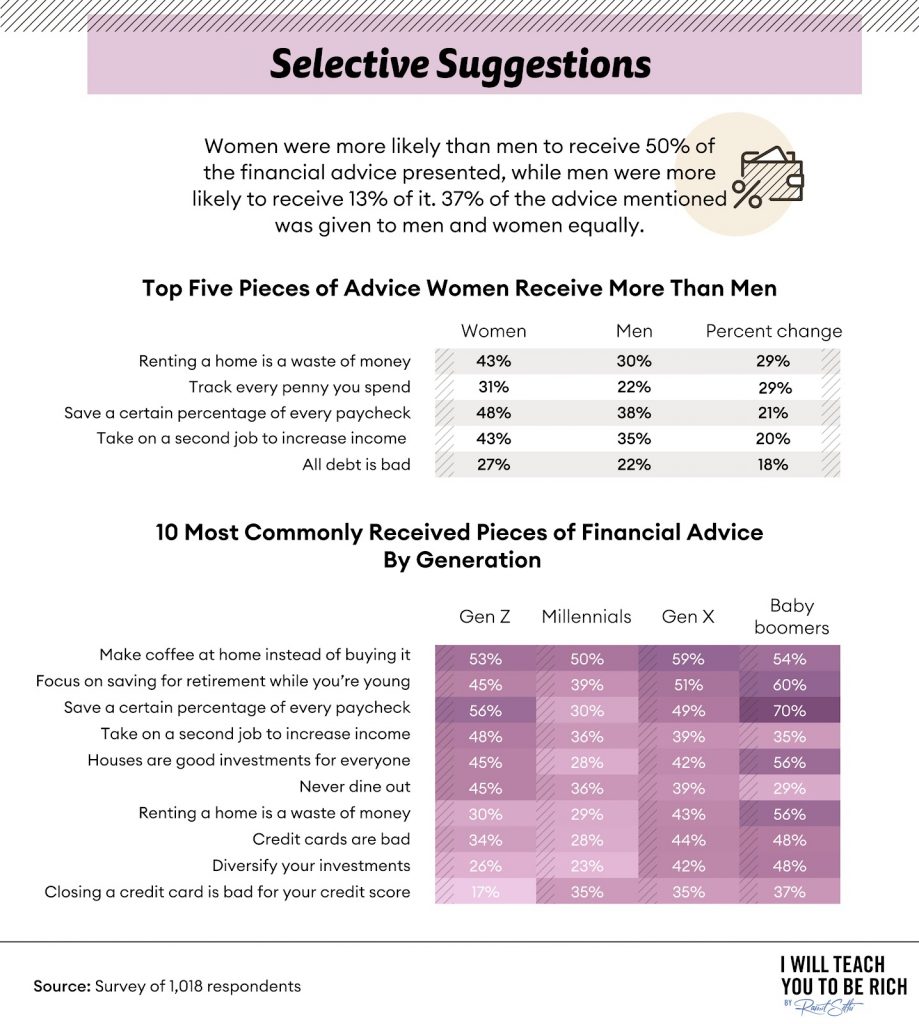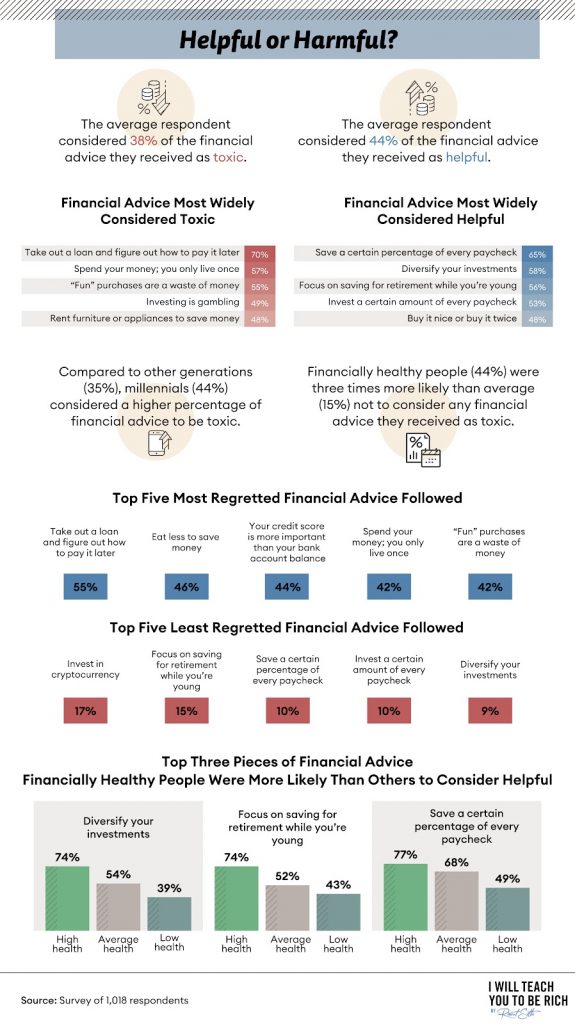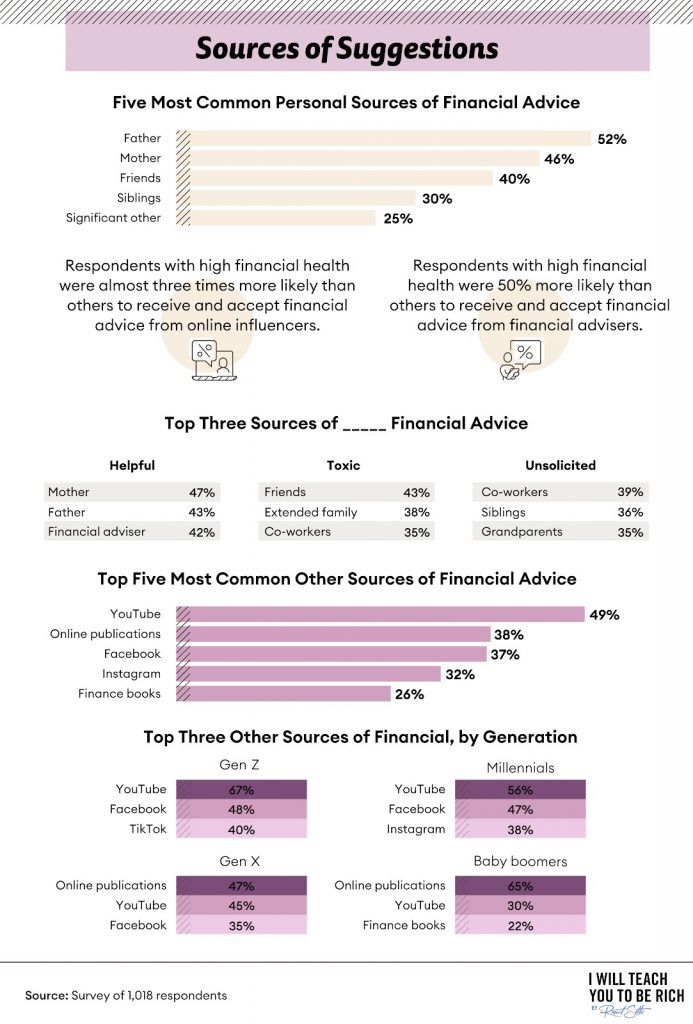Key Takeaways
- Never dine out is the most toxic piece of financial advice, followed by credit cards are bad and renting a home is a waste of money in second and third place, respectively.
- Save a percentage of every paycheck is the most helpful piece of financial advice, followed by diversify your investments and save for retirement while youre young in second and third place, respectively.
- Financially healthy people were three times less likely than average to consider some of the financial advice they’d received as toxic.
Financial advice is often given freely by well-meaning friends and family. Though well-intended, much of this advice may not always be helpful.
With so many financial strategies floating around, some might not fit your specific objectives. Other times, money management tips can be downright toxic to your financial health.
To gain insight into the topic of money management advice and whether its helpful, we surveyed over 1,000 respondents. Read along for the next few minutes as we uncover peoples thoughts on which advice is worth following.
Popular Financial Tidbits
Ask 10 different people for advice on the same financial issue, and youre likely to come away with 10 different strategies. Its undeniable that there is a wealth of financial advice out there, but discerning whats helpful from whats not can be the true challenge.
Chances are good that you, much like our respondents, have been on the receiving end of many money management tips. Here we look at some of the most ubiquitous.

A fair portion of the financial advice people cited pertained to homes and housing. For example, 54% of respondents received advice to make coffee at home, along with the 38% that heard purchasing a home is always the right move.
Depending on your lifestyle or the area where you live, renting can often be the right decision. Real estate in many markets today is booming, meaning home supply is limited amid high demand. While homeownership is the right decision for some, renting may be the right decision for many others.
Another tidbit of financial advice focused on how early one should begin saving for retirement. Saving money is always a bright idea and the earlier, the better, according to 46% of our respondents.
While many have heard that eating at home is a huge cost-saver and that credit cards are never a good idea, rarely is a one-size-fits-all strategy best for everyone.
When a relative (or several) advised you to never place all your eggs in one basket, chances are they also meant your money. Thats why 33% had heard that diversification is always best. From a generational perspective, Gen Zers and millennials were less likely to be moved by the save a portion of each paycheck speech that is so often given.
Likely, much of the financial advice given comes with good intentions. However, good intentions dont necessarily mean its well-received. Yes, exclusively eating at home may save money, but 44% felt such advice is toxic, as did the 36% that had been told renting is throwing money away.
Making coffee at home is a less expensive alternative to purchasing $5.00-plus drinks at specialty shops, and 40% of respondents said its straightforward advice to follow.
However, one-third still perceived such advice as toxic we would agree. Focusing on $5.00 money questions is distracting. Focusing on bigger financial wins will lead to more success in the long run.
Money Advice Differs Between Gender, Age
Not all financial advice finds itself distributed equally. According to our survey respondents, women were more likely than men to receive half of the money advice offered. Only 37% of financial advice was passed out equally between the sexes.

When examining the data, the most significant advice difference between men and women pertained to renting versus buying and keeping a close eye on expenditures. Women were 29% more likely to hear about these issues than their male counterparts.
Over one-fifth of women had been told to set aside a certain amount of money each payday and consider another gig to bring in extra cash. Men were 18% less likely than women to be reminded that any debt is ill-advised.
Money advice can also vary by generation. Like women, baby boomers edging closer to retirement age often heard that they need to stash money aside more than younger generations.
Baby boomers also received more advice about other issues standouts were that renting is a waste of money and that purchasing a house is always the right move.
Gen Xers and most millennials are in their prime working years and are hopefully developing healthy financial habits. The area where Gen X respondents received the most advice focused on forgoing the Starbucks drive-thru window and getting their caffeine fix at home.
Gen Zers received their fair share of advice on the importance of saving early. The money advice Gen Zers received more than other generations was to refrain from dining out and to earn additional income through a second job.
Fortunately for them, Gen Zers have additional opportunities to earn extra income more than other generations.
Taking advantage of an existing skill set can add extra savings or pay off high-interest debt. Learning how to generate income from a current hobby is another idea.
Advice Perceptions
Good advice, often given with the best intentions, can sometimes be perceived poorly.

Seven out of every 10 respondents said getting a loan without a strategy of how or when to repay it is the most ill-advised or toxic advice received. The opposite of the save-your-money crowd sometimes shows up as a distant cousin with the might as well enjoy it while you can mindset. It certainly didnt motivate 57% of the respondents on the receiving end.
While investing does come with levels of risk, 49% of respondents know that proper investing is not akin to gambling despite them having heard that toxic advice.
From 2010 through 2020, the Dow Jones Industrial Average has averaged a 10.73% return. The lowest return was a -5.63% return in 2018, with the highest being 26.5% in 2013. Only two of those 11 years produced negative returns. Given enough time, the market has always gone up historically.
Good advice from trusted sources is usually well-received. Almost three-quarters of respondents said some of the most helpful advice involved saving a percentage of each paycheck.
Spreading money around in a diversified portfolio and starting a retirement savings plan during an employee’s early years was also helpful for over half of the respondents. Millennials were also the generation that considered most financial advice received to be toxic.
Knowing when and how to perceive financial advice can be tricky. Respondents who had their finances under control were three times more likely than less financially healthy respondents to take toxic advice.
The advice around three-quarters of financially healthy people considered best was diversifying investments, saving for retirement from an early age, and designating a certain percentage to the piggy bank each month.
Want to build a business that enables you to live YOUR Rich Life? Get my FREE guide on finding your first profitable idea.
Digging for Financial Advice
In todays world of instantaneous information, finding trustworthy sources can be challenging. Relatives and some social sites were favored financial sources by many respondents.

The phrase Father knows best certainly applied to the financial advice issued by relatives, given that Dad weighed in with words of wisdom with 52% of respondents, and Mom and siblings werent too far behind.
However, the most helpful financial advice prize went to Mom, who came in 4 percentage points from Dad (47% to 43%, respectively). When it came to the top sources for the most toxic money advice, however, friends, extended family, and co-workers comprised the top-three list. Theres also unsolicited advice, most often provided to our respondents by co-workers, siblings, and grandparents.
Print material took a back seat to multiple online sources when it came to securing financial info. YouTube was the most accessed source for financial advice among almost half of our respondents. Other social media including Facebook and Instagram werent far behind.
Generationally, there were differences when respondents revealed their top financial sources. The common denominator was YouTube, with millennials and Gen Zers favoring the video channel most.
And while they agreed on Facebook as their second choice, millennials and Gen Zers split on their third preferred source, with the former choosing Instagram and the latter, TikTok.
Baby boomers and Gen Xers both preferred financial advice from online publications, with YouTube in second place. These two generations differed on their third choice, thoughbaby boomers opted for printed books, while Gen Xers cited Facebook.
Build a Financial Future Today
Investing and obtaining financial knowledge shouldnt be hard. Learning the techniques to make you rich are simple, and we help everyone get started. I Will Teach You To Be Rich educates people from all walks of life to find financial freedom.
Some of our techniques may challenge outdated personal finance advice, and were confident our strategies can prepare you to invest and manage money wisely. You dont have to give up everything in life; learn the basics and beyond to apply to your own successful financial journey.
Methodology and Limitations
For this analysis, we surveyed 1,018 respondents using the Amazon MTurk platform. Among those respondents, 562 were men, 447 were women, and nine were nonbinary. Our respondents ranged in age from 18 to 77 years old with an average age of 41.
Survey quotas were used to guarantee sufficient respondent counts from each generation, which were as follows, Generation Z: 207, millennials: 302, Generation X: 301, and baby boomers: 208.
To help ensure accurate responses, all respondents were required to identify and correctly answer an attention-check question. In some cases, questions and answers have been rephrased for clarity or brevity. These data rely on self-reporting, and potential issues with self-reported data include telescoping, selective memory, and exaggeration.
Fair Use Statement
Not everyone wants to share financial secrets, but its perfectly OK for you to pass along this article. All we ask is that you share only for noncommercial purposes and link back to the article to attribute proper credit.
